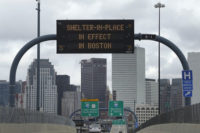After more than 10 months of careful planning for the 118th running of the Boston Marathon, Boston's hotels are gearing up for record occupancy and larger-than-ever crowds of spectators both in the city and along the 26.2 mile route. This year’s Boston Marathon will be held on April 21st.
The Boston Marathon is the second largest single day sporting event in terms of on-site media coverage, ranking behind only the Super Bowl as the largest single day sporting event in the world. Given the bombings that occurred at last year’s marathon, to say that all eyes are on Boston this year would be an understatement. The race has swelled to just over 36,000 participants, up from the average of 20,000 in prior years. The field of spectators could easily double from the average of 500,000 to over one million. “Everybody wants to come out and be part of this,” said Boston Police Commissioner William Evans. “I think we’re going to see the biggest numbers we’ve had, bigger than the 100th anniversary,” continued Evans.
Boston's hotels, many of which were directly impacted by last year’s bombings, are in highest concentration in and around the area of the finish line in Boston's historic Back Bay. Some serve as headquarters hotels for race sponsors, others house VIP runners, and others the hundreds of members of the press both domestic and international.
As participants finalize their hotel reservations and travel plans, the Boston Athletic Association has just announced a long awaited list of new security restrictions, some which have long time participants wondering how they will navigate the pre and post race security changes, which for the first time include a "no bag" policy.
Some of the announced restrictions include:
- No backpacks or any similar item carried over the shoulder, or handbags of any size.
- No glass containers.
- No containers capable of carrying more than one liter of liquid.
- No strollers, including baby strollers.
- No suitcases or rolling bags.
- No personal hydration system products (such as CamelBak®, Thor®, etc).
- No weight vests or any sort of vest with pockets (Note: lightweight running vests are allowable).
- Costumes covering the face or any non-form fitting, bulky outfits extending beyond the perimeter of the body are prohibited.
- Props (including sporting equipment and military and fire/gear and signs or flags larger than 11 inches x 17 inches) are prohibited.
- Any item larger than 5 inches x 15 inches x 5 inches will be prohibited.
Runners who need a change of clothing, shoes, or other gear will be provided with a clear plastic bag which they may drop off at the Boston Common on the morning of the race where it will be stored outside for collection by participants after the race and after exiting the secured zones. The Boston Common is approximately a half-mile walk from the finish area. Many runners will wear additional warm clothing to the starting line which they will remove prior to the race start. This clothing must be discarded. However race officials have stated that all discarded clothing at the starting line will be collected and donated to charity.
Another major change warns that public safety officials will strictly prohibit unofficial participation, and anyone in violation will be subject to interdiction. Those who are not officially registered in the Boston Marathon (sometimes referred to as Bandits) will not be allowed to participate. Participants are asked to discourage family and friends who are not officially registered participants from entering the course in any manner.
Because of the tragedies that occurred last year, many people want to participate in some way in this year’s Boston Marathon as a display of support, but officials have strongly urged those who are non-official participants to refrain from entering the course for the safety of the runners and themselves. Anyone on the course for any distance who has not been assigned, or is not displaying, an officially issued bib number from the Boston Athletic Association is subject to interdiction. The BAA reserves the right to remove any person from the course who is not displaying an official bib that has been assigned by the BAA.
Similarly, units or groups such as military ruck-marchers and cyclists, who have sometimes joined on course, will not be allowed to participate.
“We are never going to reduce the risk to zero in any event, especially ones that attract hundreds of thousands of people, but we have to do the best we can to reduce that risk, to get it as low as possible,” commented State Police Colonel Timothy Alben at a recent press conference.
Participants can also expect to find heightened security all around the city including at their hotels. Hotel security will be stepped up in many ways, most notably with regard to luggage and baggage storage.
From my perspective as the chairman of Boston’s hotel security association, ILSSA Boston, you've got major hotels at or near the finish line, many of which are just outside of the secured areas. You can expect that all hotels, but particularly those in the Back Bay will be operating under heightened security protocols. I wouldn't be surprised to see vehicle inspections at public parking garages, and a zero tolerance policy with regard to any items left unattended, or that seem out of place. Hotels will carefully scrutinize and inspect any luggage or baggage offered for storage by guests, while some hotels may decline to store luggage and bags altogether. The obvious concern is the contents of the bags. It's a real concern and one that must be taken seriously. It's our hope that our hotel guests and visitors to Boston won't be terribly inconvenienced by the necessary measures that have been put in place. We're grateful that the BAA and the Boston Police have given the public several weeks to digest and understand the security changes and make the appropriate adjustments to their race day plans.
We would encourage hotel guests with individual concerns to contact their hotels in advance. In many cases concerns can be eliminated with a simple phone call.
Let's be clear, things will be very different than in years past, but we as a community have full faith in Commissioner Evans of the Boston Police and Colonel Alben of the State Police. Both agencies and their federal partners have developed a comprehensive plan designed to protect this event, its participants, and spectators. It's our duty to lend cooperation and heed their advice. We're all in this together with one common interest...public safety.



